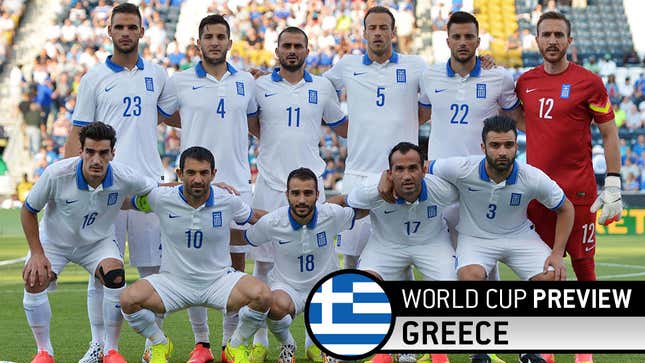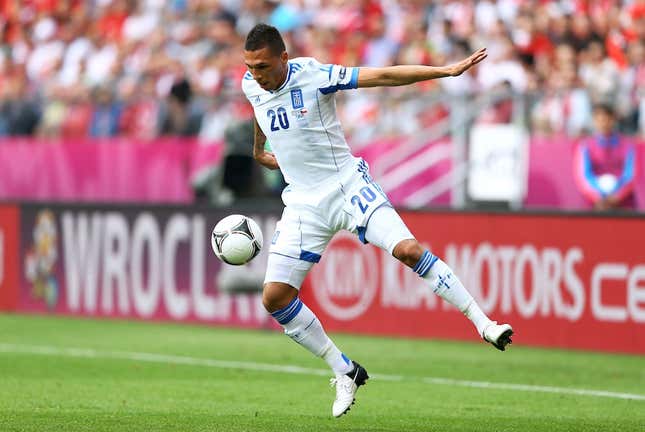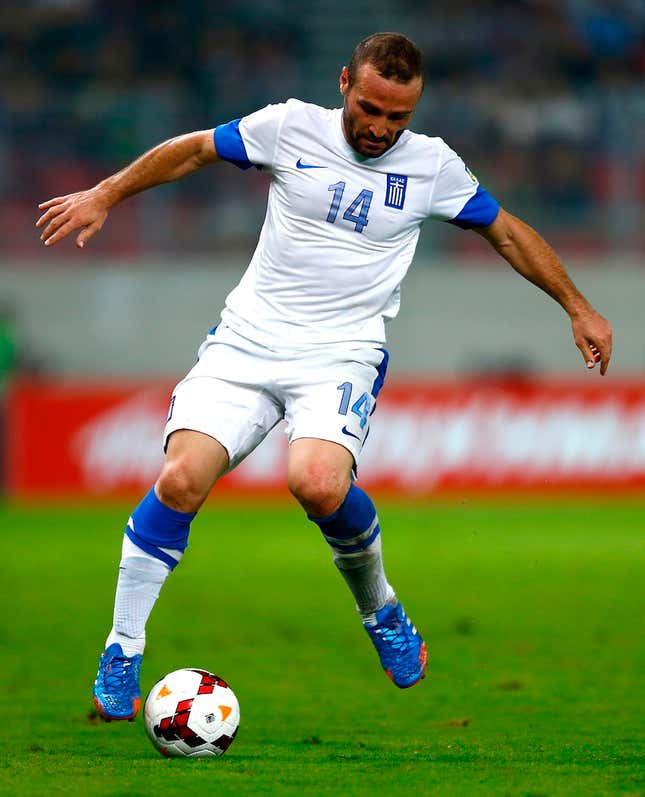
Greece has a pretty good domestic league that produces a handful of pretty good players who represent their pretty good national team. In the gauntlet that is European international competition, pretty good usually isn't enough. This year, though, Greece made it through the fire to earn a spot in their second straight World Cup, only their third ever.
In an acknowledgment of their relative station in the world, Greece play like a throwback Italy-lite. Yes, the team is more likely to score from set pieces and counter attacks and even the midfielders seem uncannily comfortable getting stuck in and defending around their 18-yard box. But this Greek side doesn't bunker so much as it injects a constant tension into every match.
Opponents don't just want an early goal against Greece; they need it, and it shows. Scoring early to make the Greeks cross their own half-way line is the only tried-and-true way to lure them from their compact shell. Urgency replaces forward-thinking calm with other teams knowing full well that the Ethniki can slug it scoreless in defense for as long as is needed. In this way, the Greek defense is actually the team's best offense.
It's a defensive, pragmatic approach that won't inspire any rhapsodies but can cause the odd upset every now and then. And they did win the European Championship in 2004, so overlook the Greeks at your own peril.
Roster
Goalkeepers: Orestis Karnezis (Granada), Panagiotis Glykos (PAOK), Stefanos Kapino (Panathinaikos)
Defenders: Giannis Maniatis (Olympiacos), Giorgos Tzavellas (PAOK), Vangelis Moras (Hellas Verona), Loukas Vyntra (Levante), Vasilis Torosidis (Roma), Sokratis Papastathopoulos (Borussia Dortmund), José Holebas (Olympiacos)
Midfielders: Alexandros Tziolis (Kayserispor), Panagiotis Kone (Bologna), Giorgos Karagounis (Fulham), Lazaros Christodoulopoulos (Bologna), Giannis Fetfatzidis (Genoa), Kostas Katsouranis (PAOK), Andreas Samaris (Olympiacos), Panagiotis Tachtsidis (Torino)
Forwards: Georgios Samaras (Celtic), Kostas Mitroglou (Fulham), Dimitris Salpingidis (PAOK), Theofanis Gekas (Konyaspor)
Nickname
Ethniki, Piratiko
FIFA World Ranking
12
Manager
Fernando Santos
Players To Watch
José Holebas, Left Back

The German-born Olympiacos left back owns the left side of Greece's formation.
Greece play incredibly lopsided, either to facilitate Holebas's frequent forays on the left wing or because of them. Left-sided forward Georgios Samaras will shift a full 30 yards toward the middle to make room for Holebas. Without those runs, his team would have no natural width.
Greece have other dangerous players, sure. But Kostas Mitroglou's perma-scowl leaves more of an impression than his play. And it's not what Samaras does on the pitch that's so awe-inspiring; it's that he's out there running around in the first place.
But while Mitroglou will poach and Samaras will do the same or rip in a cross from wide, Holebas's style of play screams "I'm coming!" from the first moment a blade of space opens up on his attacking flank.
He's not the kind full back content to loiter around the 18-yard box and maybe boot in an early cross or lay off to a midfielder before shuffling backwards. When Holebas gets forward, he starts playing like a winger.
Holebas will trick and feint his way around the final third and he has no problem cutting straight to goal himself. His recovery speed means he can get back in time if he turns the ball over, but he doesn't look to worried about consequences when he's carving up a defense and blasting a shot of his own.
He is all engine. He makes the 50-yard overlapping run look routine. That's insane. But it's Greece.
And perhaps more than any other player, Greece needs Holebas.
Dimitris Salpingidis, Winger/Attacking Midfielder

Greece will depend on Salpingidis to A) not strand striker Mitroglou alone on an island up top,B) score. Salpingidis's four goals in qualifying was the team's second-highest tally.
Greece can't afford to play a dedicated number 10. But Salpingidis, manning the right wing or playing off of Mitroglou, is the closest Greece come to fielding a true playmaker. He appears to have little preference between finishing or feeding, making the veteran that much harder to defend. When marking goalscorers, defenders can push up close to them as they near the 18-yard box, knowing they're about to shoot. For more pass-happy players, defenders can lay back a bit and focus on cutting out passing angles. Players like Salpingidis leave backs thinking for that critical split second between making a tackle and conceding a goal.
Better still, Salpingidis brings balance. For all the left-sided exploits of Samaras and Holebas, it's really easy for a World Cup team to defend one side of the field. Without Salpingidis' willingness to pull wide right when needed, Greece's formation would collapse on itself.
Without the creativity of Salpingidis, the Ethniki might choose to retreat into their familiar bunker, making for three (or more) nigh unwatchable matches. So be grateful for Salpingidis, in what is likely the 32-year-old's final World Cup. Greece certainly is.
Tactics
Playing against more talented European squads in World Cup qualification, Greece almost by necessity have have to be a defensive team. The critical component of their defensive strategy is pressing high up the pitch. The Greeks houd opposing defenders and midfielders from the first whistle to the last, hoping to force a turnover and an easy chance on goal on the counter.
When in attack, the Greeks shuffle forward with a five-man midfield, but also have no problem bypassing that numerical advantage by punting long balls, especially with Georgios Samaras playing as a second target on the left wing of a 4-3-2-1.
The 6-foot-4 veteran is the second-most important cog in Fernando Santos's attack only behind line leader Mitroglou. It's Samaras's combination with left back José Holebas, though, that truly makes Greece tick.
Mitroglou shades to the left, allowing Dimitris Salpingidis to pinch forward while the more plodding support of midfielder Alexandros Tziolis and right back Vasileios Torosidis feeds them from deep.
But when Greece does come down the right side, Samaras shifts to a thoroughly central position, leaving acres of space for Holebas to cut through on the left wing.
From there, Greece is content to send early balls to Mitroglou, either inverting to serve crosses over the top or sending Holebas to cut into the box himself.
So while Greece's relative talent disparity means they're more comfortable defending than attacking, Santos' side does have a couple go-to tactical tweaks to knock in a few goals. This is not the overly grinding Greece of a few years ago. Instead, this is a team that promises to spread the last-gasp tension of its unrelenting defense throughout the 90 minutes of each of its matches this summer.
Group C Fixtures
All times Eastern
June 14, noon: Colombia vs. Greece at Estádio Mineirão
June 19, 6 p.m.: Japan vs. Greece at Estádio das Dunas
June 24, 4 p.m.: Greece vs. Ivory Coast at Estádio Castelão
Complete Group C Previews
Colombia | Ivory Coast | Japan | Full Archive
Screamer is Deadspin's soccer site. We're @ScreamerDS on Twitter. We'll be partnering with our friends at Howler Magazine throughout the World Cup. Follow them on Twitter, @whatahowler.
Top image by Jim Cooke; photos via Getty.